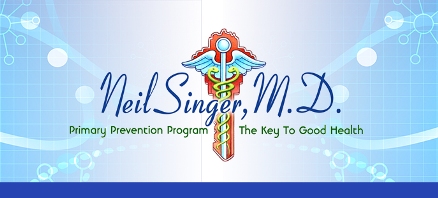

What is “Primary Prevention”?
Prevention is better than cure. – Desiderius Erasmus
Definition
Primary Prevention, as it pertains to the practice of medicine, means taking measures to prevent disease or ill health. An example would be immunizations, which attempt to prevent people from developing a disease in the first place. This is in contrast to secondary prevention, which involves strategies to diagnose and treat an existing disease in its early stages before it results in significant morbidity. An example of this would be a mammogram, which is aimed at finding breast cancer in its earliest stage. Tertiary prevention, then, involves treatment of established disease by restoring function and reducing disease-related complications. This, unfortunately, is the focus of most physician practices, and involves already established disease that is already causing health problems.
Explanation
I think most of you would agree that taking measures early on to prevent disease is the key to good health, hence my tagline “Primary Prevention Program-The Key To Good Health”. Most physicians would agree with this also. Why then do most physicians not devote most of their time trying to keep their patients healthy by practicing primary prevention? The answer is simple - time and money.
Believe it or not, it takes a lot more time for a physician to prevent disease than to treat it. It takes time to perform a complete physical exam, discuss the results of the physical and lab work in a non-hurried manner, and sit down with a patient and explain to him, in a manner that he understands, why it is important to take certain steps to promote good health. Primary prevention does not simply involve giving a patient a pill and sending him on his way – it involves, among other things, educating the patient on a variety of matters. It involves changing patients’ behavior regarding diet and exercise and it often involves close follow up – more time than a traditional physician has. Simply put, there is not enough time in the year for any doctor practicing traditional medicine to spend with each patient on prevention strategies. Hence doctors practice reactive medicine - waiting for a patient to get sick, call the office for an appointment, get in to the office when the doctor has an opening in his already packed schedule, and then an attempt to diagnose, treat, and ensure adequate follow-up in a ten or fifteen minute appointment. This is not an ideal situation
Money, or the lack of it, is the other main reason that most physicians do not practice primary prevention. Insurance companies have traditionally, and continue, to reimburse physicians much more to treat established disease than to prevent disease. A physician can make much more money seeing four patients an hour for a cold than to spend that time performing a physical on a 60 year old, talking to that patient about the findings, and explaining why it is important to modify his diet, exercise, and take preventive vaccines. Traditional insurances and Medicare do not see the value in prevention of disease and therefore do not reimburse physicians appropriately. Kaiser Permanente, the original HMO, on the other hand, has seen the value of preventive strategies for decades and is therefore the prime example of how primary prevention can save patients and insurance companies money. Again simply put, physicians in traditional practices cannot afford, in today’s economic climate with current insurance reimbursement , to practice primary prevention.
Philosophy
Five years ago, after 28 years practicing internal medicine in the traditional manner, I decided to devote my remaining years in medical practice to keeping patients as healthy as possible and to be proactive instead of reactive. This necessitated a radical change in my practice – hence the “concierge model” of my current practice. It is only in this type of smaller practice, partially subsidized by patients’ annual fees which allows me to devote the necessary time to each patient, that a physician can truly practice primary prevention. I am totally convinced that a medical practice devoted to prevention of disease, as opposed to one that profits primarily on the treatment of disease, is the best for patients and society. Prevention and early detection of disease is the only way that our medical system will survive its current sad state of affairs.
My practice involves everything necessary to keep every patient as healthy as possible and to either prevent disease in the first place or delay the progression of already established disease. This involves, among other things, obtaining an extensive medical history, ordering extensive and advanced blood work, having the patient complete questionnaires on a variety of subjects, performing screening examinations in the office, doing a complete physical exam and discussing the results of that exam and the blood work, discussing strategies to avoid disease, and mailing out a summary of my findings to patients. The above is performed every year on every patient in my practice. It is only in this manner that primary prevention can truly be practiced.
Please see elsewhere in this web site for the exact features included in the “Primary Prevention Program".
Address:
20 Roadrunner Drive,
Suite D
Sedona, AZ
86336
Phone:
(928) 204-4901
Fax: (928) 204-4917
Email: drsinger@nsmd.co